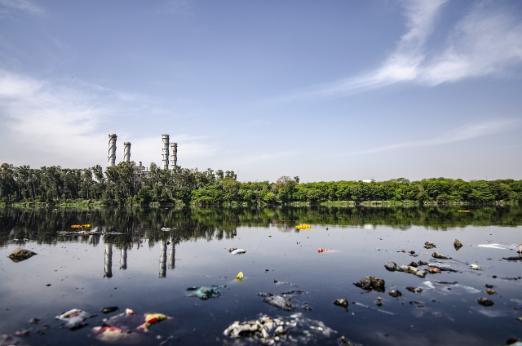Introducing Our New National Centre for Resilience Research Director
Published: 23 August 2023
Join us in welcoming our latest team member, Dr Michelle Bloor, as she takes on the role of Research Director. With a strong background in Environmental Science and Risk, Michelle brings a wealth of expertise in pollution prevention and chemical management. In addition to her work with the NCR, Michelle is currently a senior lecturer in Environmental Science and Risk at the School of Social and Environmental Sustainability at the University of Glasgow.

I am passionate about the transfer of science to regulation and therefore, my research not only looks to explore solutions to chemicals, waste and pollution prevention challenges, but also explores how we can ensure the most robust science can feed into the global framework and policies to support the continued sound management of waste and pollution prevention challenges. In 2022, I was invited to become a member of the Technical Advisory Group to the United Nations Environmental Programmes (UNEP) Executive Director and subsequently I joined UNEPs Roster of Experts in this arena. I am also a Sherpa to the European Commission’s High Level Round Table for the implementation of the Chemicals Strategy for Sustainability, a member of the UK Government’s Chemicals Stakeholder Forum, and I Chair the Society of Environmental Toxicology and Chemistry’s Advisory Panel on Chemicals Management.
We are experiencing three planetary crises; climate change and biodiversity loss are well known and have their own science-policy panels to publicise, inform, develop and advance solutions. The third crisis is a little less in the public eye. This third crisis is pollution. However, climate change, biodiversity loss and pollution are not independent - they are interconnected, affecting one another in ways that must be addressed. While the Intergovernmental Panel on Climate Change (IPCC) was established to provide policymakers with regular scientific assessments on climate change, its implications, and potential future risks, as well as to put forward adaption and mitigation options, and the Intergovernmental Science-Policy Platform on Diversity and Ecosystems Services (IPBES) was established to support biodiversity and ecosystem services, there is currently no mechanism to address pollution prevention.
At the moment, we see a very siloed approach to the sound management of chemicals, waste and pollution prevention, with individual nations having developed or starting to develop their own policies or strategies on dealing with, responding to, and mitigating the issue, by implementing chemicals and sustainability initiatives. However, chemical pollution is in fact a global challenge and we need to see a joined-up approach with nations collaborating to seek global solutions, develop global definitions and to tackle head on this concerning challenge. We know from past experience that often the actions and policies of developed countries have a negative impact on the developing nations, and it would be wise to avoid revisiting past mistakes by working together to develop strategies and agree solutions to a challenge that knows no boundaries.
The Strategic Approach to International Chemicals Management (SAICM) was adopted in 2006 as a policy framework to promote chemical safety around the world. There are also of course existing Multilateral Environmental Agreements (MEAs) involved in a broad range of international cooperation, including but not limited to, the Basel, Rotterdam, and Stockholm Conventions. However, according to scientists, the lack of a science-policy interface is limiting the ability of decision makers to identify and address the related threats in a timely manner. In March 2022, United Nations Environmental Assembly (UNEA) Resolution 5/8 declared that a science-policy panel should be established to contribute further to the sound management of chemicals and waste and prevent pollution, and to convene, subject to the availability of resources, an ad-hoc Open Ended Working Group (OEWG) that began work in 2022, with the ambition of completion, and establishment of the new science-policy panel, by the end of 2024.
We live in a consumer driven world, which craves the latest fashions and technologies. Waste generation, and the pollution from that waste, is not an idle threat. We discovered in past decades that the way we dispose of our waste is vitally important for human and environmental health, for example, the 1956 identification of mercury diseases in Minamata residents in Japan, which resulted from a chemical effluent containing methyl-mercury being released into the Bay of Minamata, which biomagnified through the food chain. The Minamata Convention on Mercury is now in place to protect human health and the environment from anthropogenic emissions and releases of mercury and mercury compounds.
Globally, there are approximately 350,000 chemicals on the market, and of course, in today’s society, we strive for safer and sustainable by design chemicals and products, at any stage of their life cycle, to be developed, and we aspire to minimise their pollution. However, we need to be mindful of legacy chemicals left over from past activities, which still require disposal or remediation. In reality, waste and chemical pollution is going to be in the environment, in one way or another, for a very long time to come and we need to adopt a holistic approach, which offers humankind and our planet the greatest protection and avoid prioritising one ecosystem at the expense of our other ecosystems.

As I reflect, it is very clear that all agencies, science-policy panels, multilateral agreements and other existing mechanisms need to start collaborating. Simplified, joined up approaches are needed to address the challenges of chemicals management. We need a road map, the removal of silos, and evidence based robust science should be at the heart of the process. All stakeholders should be included in the process, such as, academia, business, government, NGOs, indigenous knowledge, children and youth etc., and we also include multidisciplinary and transdisciplinary collaborations. However, at its very core, transparency and a very clear conflict of interest policy is needed at every stage of the process.
My own research fits perfectly with the scope of the National Centre for Resilience (NCR) and I was delighted in 2022 to receive NCR funding for the RIFFLE project - Risks of the Remobilisation of Pollutants from River Sediments during Flood Events. Having had the opportunity to receive NCR research funding and having work closely with the NCR team for the duration of the project, it is very clear to me that the NCR has a pivotal role for an interconnected Scottish resilience community. I am very honoured to be appointed as the Research Director of the NCR and I look forward to working with the Steering Group to strengthen relationships between academia, policy and practice, and to deliver successful collaborations.
First published: 23 August 2023
<< News

